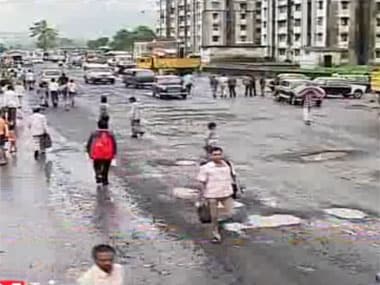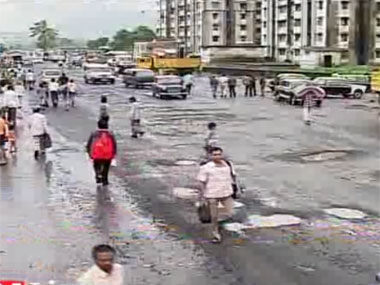If you are a Mumbai citizen, you may think it is time to rejoice because an elected city official has said that the city will not give up on the annual mess called potholes. According to the
Indian Express
, Rahul Shewale, chairman of the standing committee of the Municipal Corporation of Greater Mumbai, is all set to try out yet another ‘new technology’. Apparently, it is a set of multi-positioned cameras, ground-penetrating radar, and GPS mounted on a vehicle to detect and record potholes, cracks or any uneven surfaces. They will be recorded and “the mechanism also involves an automatic system of fining and billing contractors”. He said, the new technology “will be used on an experimental basis” and if successful, put to effect to “fill potholes and strengthen the road network." [caption id=“attachment_994969” align=“alignleft” width=“380”]
 Image of a Mumbai road filled wih potholes. Screengrab from IBN-Live video[/caption] Given the city’s experience, he is cautious. One has to note that it is only going to be an experimental. If it failed, don’t hold the civic body responsible for them; the technology, you see, would have failed. This is not the first time that the city government has spoken of, and the media reported them faithfully, such good intent for the benefit of the dismayed Mumbai citizens. Perhaps, this is a big PR gambit: each time, the civic body thinks, such hopes are held out, the criticism about its roads would mute. Till the next monsoon by when contracts would see renewed efforts at road repairs. Each time, as we also know, the experimental efforts have failed. But the city has never failed to have its more than required share of potholes. Each year, more potholes appear, and each year, they appear sooner in a monsoon that they did the previous year, perhaps. Perhaps, just perhaps, the city government should consider another new experiment whose components are follows: First, identify a new set of credible and reliable contractors with experience of really building roads and maintaining them. Discard each one of the past contractors, even if they change their letterheads with new names. Second, lay down clear specifications which cover every aspect – the material and their quality, and the process. Three, specify that failure to deliver quality roads, and on schedule, would lead to punitive action which includes cases against them for wilful cheating. Four, abandon the practice of only lowest tenders being acceptable and simultaneously, allowing arbitrary cost escalations. Five, ensure that the civic engineers visit the spots, inspect the road or surface-laying work. Six, install CCTV at the sites, including where the mixing of material is carried out. Strict quality checks of material – sand, gravel asphalt, should be a standard practice. Seven, once a road is being worked on, carry out spot checks by drilling holes, pick up the stuff and test them to see if they adhere to the specifications. For a start, appoint independent consultants to monitor separately what the officials are doing as part of their normal mandate. Eight, modify the contractual terms which require the contractors to compensate for any losses to the road users because of the poor quality which may ensue despite all checks. If they don’t agree to such liabilities, take it up on itself. Nine, disclose all contract details, including specifications in understandable language, not in officialese or only in technical terms, on its website. Also identify the officials engaged in supervision, the standing committee members who lobbied for, or agreed to, a contract or contractor. Ten, instil fear in the officialdom by informing it that they are equally responsible for ensuring good quality execution, and if there are flaws found, they pay by loss of designations by a few notches. Eleven, if the politicians interfere, ignore them, for execution is the Municipal Commissioner’s responsibility and he cannot carry out that function with his hands tied. Since most of these are normally expected of any entity, especially those using public funds for public goods, these are not earth-shaking changes in approach. Only thing is they have shamefully abandoned good practices. Since good practices have been forgotten, they would be a new experiment. If faithfully tried, the city may be spared the potholes, and the civic body the blushes, the latter, however, being admittedly wishful because it has shown us over the decades that it actually gives a damn.
Image of a Mumbai road filled wih potholes. Screengrab from IBN-Live video[/caption] Given the city’s experience, he is cautious. One has to note that it is only going to be an experimental. If it failed, don’t hold the civic body responsible for them; the technology, you see, would have failed. This is not the first time that the city government has spoken of, and the media reported them faithfully, such good intent for the benefit of the dismayed Mumbai citizens. Perhaps, this is a big PR gambit: each time, the civic body thinks, such hopes are held out, the criticism about its roads would mute. Till the next monsoon by when contracts would see renewed efforts at road repairs. Each time, as we also know, the experimental efforts have failed. But the city has never failed to have its more than required share of potholes. Each year, more potholes appear, and each year, they appear sooner in a monsoon that they did the previous year, perhaps. Perhaps, just perhaps, the city government should consider another new experiment whose components are follows: First, identify a new set of credible and reliable contractors with experience of really building roads and maintaining them. Discard each one of the past contractors, even if they change their letterheads with new names. Second, lay down clear specifications which cover every aspect – the material and their quality, and the process. Three, specify that failure to deliver quality roads, and on schedule, would lead to punitive action which includes cases against them for wilful cheating. Four, abandon the practice of only lowest tenders being acceptable and simultaneously, allowing arbitrary cost escalations. Five, ensure that the civic engineers visit the spots, inspect the road or surface-laying work. Six, install CCTV at the sites, including where the mixing of material is carried out. Strict quality checks of material – sand, gravel asphalt, should be a standard practice. Seven, once a road is being worked on, carry out spot checks by drilling holes, pick up the stuff and test them to see if they adhere to the specifications. For a start, appoint independent consultants to monitor separately what the officials are doing as part of their normal mandate. Eight, modify the contractual terms which require the contractors to compensate for any losses to the road users because of the poor quality which may ensue despite all checks. If they don’t agree to such liabilities, take it up on itself. Nine, disclose all contract details, including specifications in understandable language, not in officialese or only in technical terms, on its website. Also identify the officials engaged in supervision, the standing committee members who lobbied for, or agreed to, a contract or contractor. Ten, instil fear in the officialdom by informing it that they are equally responsible for ensuring good quality execution, and if there are flaws found, they pay by loss of designations by a few notches. Eleven, if the politicians interfere, ignore them, for execution is the Municipal Commissioner’s responsibility and he cannot carry out that function with his hands tied. Since most of these are normally expected of any entity, especially those using public funds for public goods, these are not earth-shaking changes in approach. Only thing is they have shamefully abandoned good practices. Since good practices have been forgotten, they would be a new experiment. If faithfully tried, the city may be spared the potholes, and the civic body the blushes, the latter, however, being admittedly wishful because it has shown us over the decades that it actually gives a damn.
Mahesh Vijapurkar likes to take a worm’s eye-view of issues – that is, from the common man’s perspective. He was a journalist with The Indian Express and then The Hindu and now potters around with human development and urban issues.
)